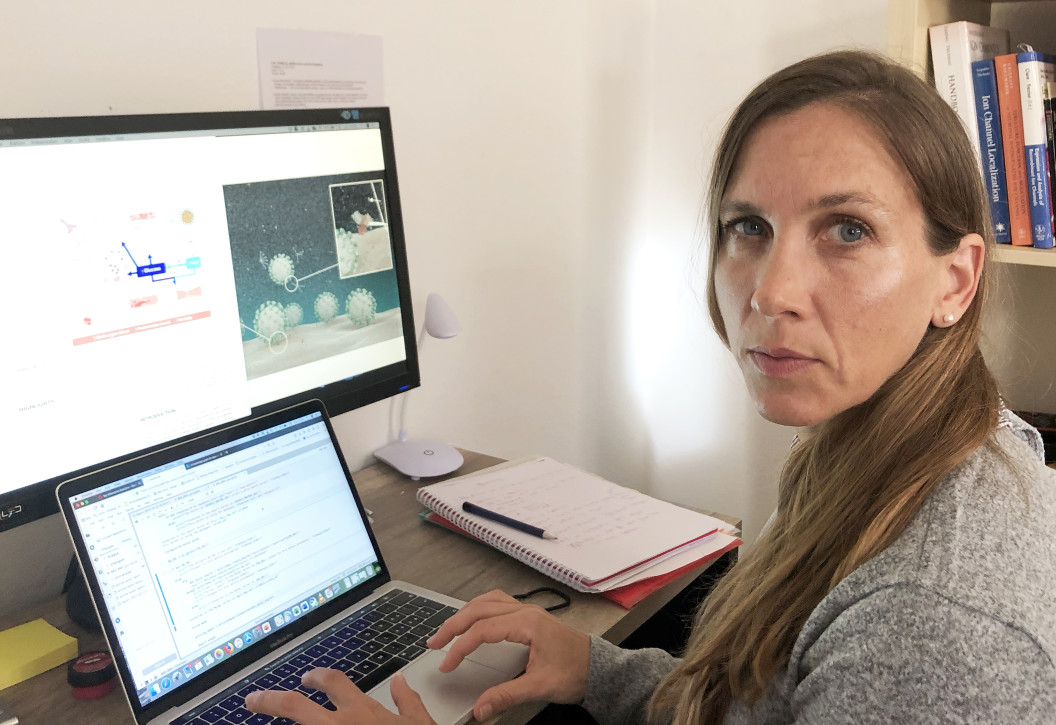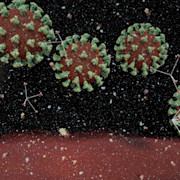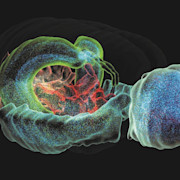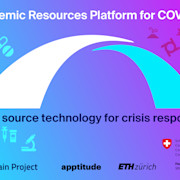- Science News
- Featured news
- Why is Covid-19 more severe in some patients? Using AI, we found a likely answer
Why is Covid-19 more severe in some patients? Using AI, we found a likely answer
By Dr Emmanuelle Logette, EPFL Blue Brain Project

Dr Emmanuelle Logette of the EPFL Blue Brain Project
Why does Covid-19 present itself more severe in some patients but not in others? The question has puzzled researchers and clinicians since the start of the pandemic, but recent research from the EPFL Blue Brain Project may have found a major clue to solving the mystery thanks to machine learning.
Now, one of those leading the breakthrough research, Dr Emmanuelle Logette, reveals as part of the Frontier Scientists series how even at a very young age she knew she wanted to be a researcher in the fascinating world of genetics.
Dr Emmanuelle Logette studied molecular biology and biochemistry at the University of Burgundy in France and, in 2002, received her PhD, for her work on the transcriptional regulation of caspase-2, a not very well known member of the caspase family of enzymes involved in apoptosis.
In 2006 she joined the laboratory of Dr Jürg Tschopp at the University of Lausanne as a postdoctoral fellow focusing on the signaling pathways involved in DNA repair and apoptosis during tumorigenesis, again trying to better understand the role of caspase-2.
Having mainly worked on the oncogenesis field, she then joined the Blue Brain Project at École Polytechnique Fédérale de Lausanne (EPFL) in 2010. She worked with the membrane systems group that studied ion channels kinetic in the brain, giving her the opportunity to approach the field of neurosciences.
She then brought her strong expertise in molecular and cellular biology to set up a platform to generate the most extensive library possible – of ion channels expressing cell lines – in order to characterize their kinetics in highly standardized conditions. This titanic work allowed her team to publish the first complete kinetic characterization of voltage-gated potassium channels in a controlled environment.
What inspired you to become a researcher?
When I was a child and people asked me what job I wanted to do when I was older, I answered, “I want to be a researcher”, and people were usually surprised with this answer. I also clearly remember my first genetic course and finding that chromosomes, DNA, genes and genetic diseases were fascinating to me. From then on I knew I wanted to study genetics.
Even today, I’m still fascinated by genetic and molecular biology; that one single faulty base among the 3bn bases in our genome could lead to a dramatic genetic disease.
During my educational and research career I also had the chance to be supervised by passionate people who have transmitted to me this passion for biology and research.
Can you tell us about the research you’re latest on?
My latest research was really different from anything I have done before, but is probably the one I’m most proud of.
In March 2020, the Covid-19 pandemic appeared and we were all locked down at home. I had to reorganize my work at home, ensure continuing education for my kids.
Then, as a biologist and as a researcher, I knew I could use my scientific knowledge and expertise to help the fight against the virus. Prof Henry Markram, director and founder of the Blue Brain Project, called me saying: “You are our molecular biologist, let’s work on it!”
It was at that point that we started brainstorming on how we could use all our knowledge, tools and expertise to help the scientific community in this fight.
Not long after, the CORD-19 database was released and that was the start of a fantastic and unexpected collaboration of Blue Brain’s experts. It was one year of intensive work – everyone with their own expertise working together – to discover that blood glucose level could be the main factor explaining Covid-19 severity. We hope this publication will be helpful in strategies for dealing with the pandemic.
In your opinion, why is your research important?
I do think that it was important to participate in the global effort against the pandemic that has affected millions of people. The main important aspect of this research is that we were able to quickly redirect our expertise and tools developed to digitally reconstruct and simulate the mouse brain, for the global effort in tackling Covid-19.
What are some of the areas of research you’d like to see tackled in the years ahead?
I’m convinced that poor diet and lifestyle are responsible for an enormous number of chronic diseases. For many years, fat was the enemy of health, before realizing that the actual ‘devil’ is probably sugar. We are spending effort, time and money to treat diseases such as diabetes or obesity – which are becoming global epidemics – when tackling the cause would be the right approach.
More research should be conducted into deciphering the effect of diets on chronic diseases such as diabetes, cardiovascular diseases, and obesity, among others. We have today more and more evidence that low-carb high-fat diets are beneficial and may prevent a number of chronic diseases.
This includes not only diabetes and obesity, but also cancer, Alzheimer’s disease or depression, that are all global health concerns. However, more studies are still needed to convince the community that diet is a corner stone of our health.
How has open science benefited the reach and impact of your research?
We have developed an AI technology to be able to read thousands of papers, synthetize the knowledge and come up with an answer to an important question, in the battle against the Covid-19 pandemic. A task that a human could not have done.
Access to open scientific literature is the foundation of our work. These kinds of techniques and approaches are going to be more and more necessary, and clearly show the importance of open science. Open-access literature can accelerate science and help address so many other diseases or questions in research.
In turn, we have made the tools used in this study open source, and you can find out more on our dissemination platform, the Blue Brain Portal.
If you have recently published your research with Frontiers and believe you have a story to tell, then you might feature as part of our new Frontier Scientists series! Send an email with the subject line ‘Frontier Scientists’ and your name to press@frontiersin.org , as well as details on what your most recent research was about.
REPUBLISHING GUIDELINES: Open access and sharing research is part of Frontiers’ mission. Unless otherwise noted, you can republish articles posted in the Frontiers news blog — as long as you include a link back to the original research. Selling the articles is not allowed.







